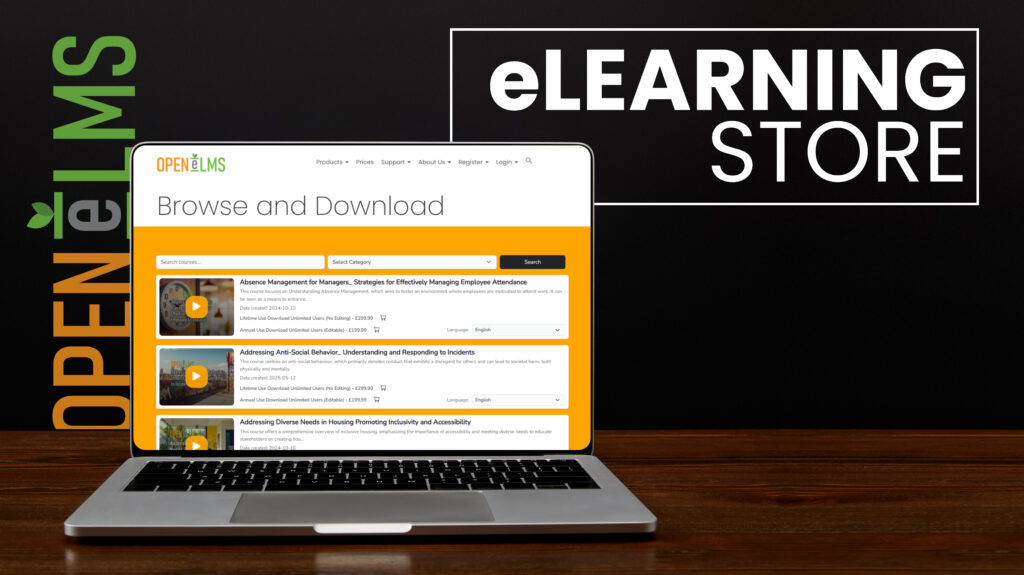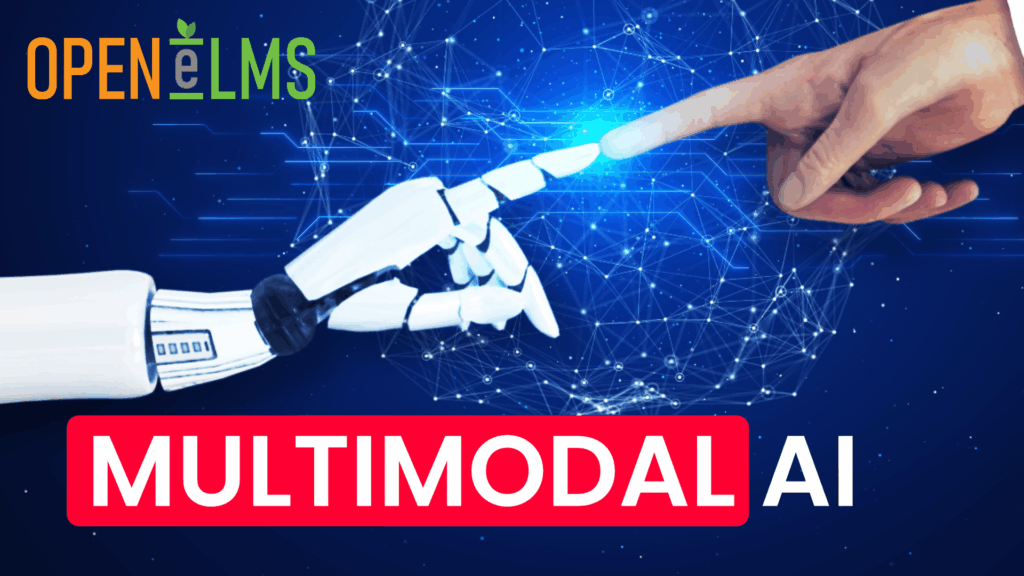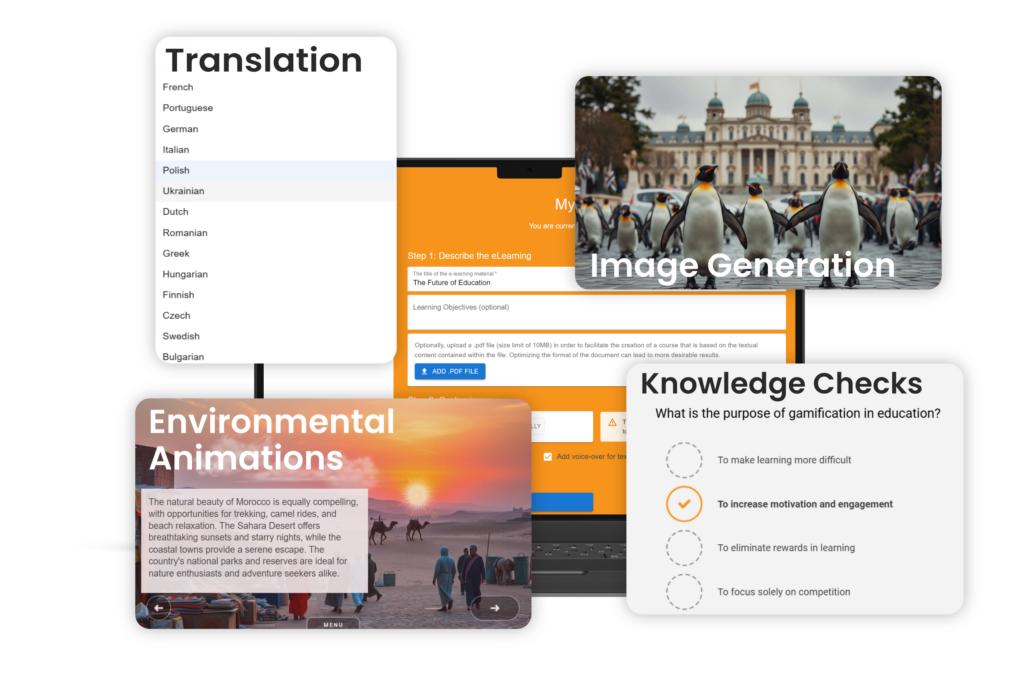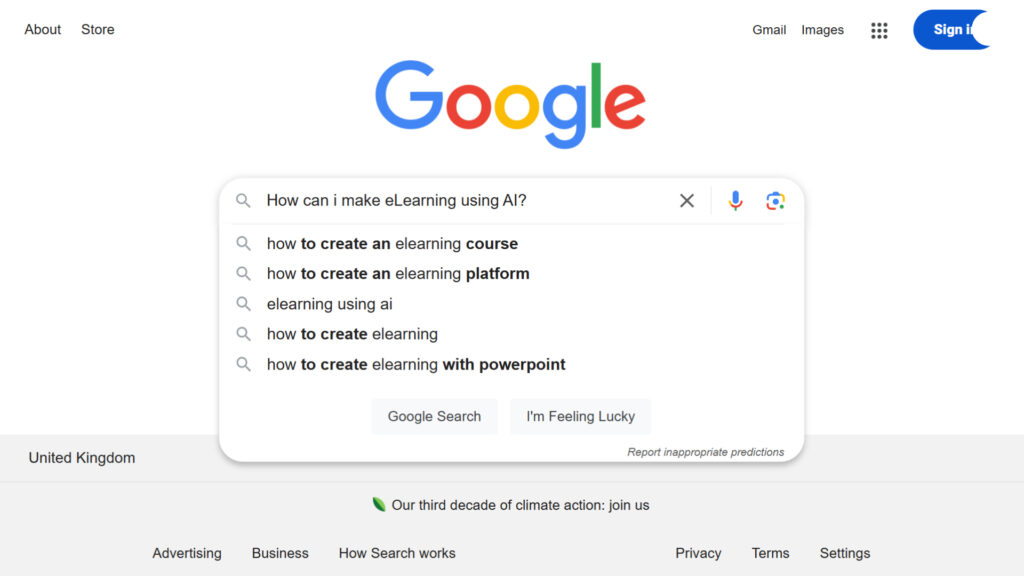How AI and the Power of Vibe Design is Transforming eLearning

One of the most powerful emerging trends in AI is Vibe Design, a new approach that prioritises emotional resonance, intuitive design and intelligent automation. As pioneers in educational technology for over 21 years, we’ve seen the landscape evolve from static slideshows to interactive, blended learning environments. Now, we’re entering a new chapter where the “vibe” of your learning content matters just as much as the information itself. What Is “Vibe” in the Context of AI? The term “vibe” in AI refers to the overall emotional tone or aesthetic quality that artificial intelligence can interpret and reproduce. Instead of feeding AI a strict script or linear instructions, we can describe a mood, an atmosphere or an intent. The AI takes that and fills in the details, whether it’s creating a video, building software or designing an eLearning course. This intuitive method of working with AI is now surfacing across three key areas: Vibe Coding: Building software through plain language prompts Vibe Marketing: Creating and distributing professional content through AI agents Vibe Design: Designing emotionally intelligent, high-impact eLearning using AI The Rise of Vibe Coding and AI in Software Development Vibe Coding allows developers (and even non-developers) to build functioning apps and systems using only natural language. At Open eLMS, we use AI to generate functions, debug code, and produce interface components by simply describing what we need. In just six months, our development workflow has accelerated dramatically. We believe that within the next two years, the traditional concept of “coding” will fade. In its place, we’ll see users defining problems and goals, while AI agents build the digital tools to solve them. AI-Driven Marketing with Vibe Vibe Marketing takes the same AI-first philosophy into branding, outreach and advertising. We’ve developed a network of AI agents that work together, scriptwriters, illustrators, directors, and editors, under human supervision. These agents collaborate in minutes to create high-quality promotional content, which is then reviewed and distributed by our team. The result? Engaging, consistent marketing outputs, created with unprecedented speed and creative alignment. Introducing Vibe Design: The Future of eLearning Creation The most exciting application for us is Vibe Design; a new approach to AI instructional design. Built into the Open eLMS AI platform, it enables users to generate complete, multimedia-rich, interactive learning experiences in just minutes. Here’s how it works: Upload a document or input a short description AI instantly creates narrated videos, animated visuals, and written content The platform designs the course using best-practice layouts and UX principles You can review, edit and tailor every detail to match your audience This is AI in eLearning with creative intelligence, combining automation with emotional relevance and design thinking. Multimodal Learning That Resonates Our AI doesn’t just build content, it builds aesthetic content. Visuals are generated or sourced from a vast media library to match the course topic. Voiceovers are tailored in tone (humorous, formal, instructional), and the script aligns with your brand voice. This is learning that looks and feels like it was designed by a creative team, because, in part, it was. The platform supports: Quizzes and assessments Interactive branching scenarios Custom media integration Live editing with our built-in course editor This approach to multimodal learning supports deeper engagement and better retention, delivering real-world learning outcomes that learners can feel. Designed by AI, Guided by Experts Our goal is not to replace human learning designers, but to empower them. With Open eLMS AI, professionals can skip the repetitive groundwork and focus on crafting content that matters. Our platform turns your ideas into high-quality digital learning, fast and gives you full creative control at every step. With over two decades of content development and learner feedback built into our models, you get more than an automation tool, you get AI-enhanced instructional design that works. See Vibe Design in Action We recently created a marketing video using our Vibe Marketing AI agents, without actors, directors or illustrators. This is the power of coordinated AI workflows producing professional content under expert supervision. https://youtu.be/pzDLUXPxSGc Start Creating AI-Driven eLearning Courses Today At Open eLMS, we believe in combining the power of AI with the experience of learning professionals. With Open eLMS AI, you can create stunning, professional-grade online courses in minutes, ones that are not just informative, but immersive. Try Vibe Design with Open eLMS AI Deliver learning with emotional resonance Reduce time-to-market for training courses Export SCORM content for any LMS Translate, localise and edit with ease Ready to experience the power of Vibe Design? try our AI powered eLearning design agent today, free for the first 14 days. Access Open eLMS AI Or email us at sales@openelms.com to book a demo or explore our AI course creation tools. Create learning that feels right, powered by AI.
Introducing: Open eLMS eLearning Store

Over the last 21 years, we’ve developed one of the most comprehensive eLearning libraries available. Rich, interactive content designed to support meaningful learning outcomes across every sector. Our courses are professionally produced, regularly updated, and designed to engage learners through video presenters, voiceovers, quizzes, and animations. But there was always one problem. No matter how great the content was, many organisations couldn’t easily access it. They were locked into subscription models, user-based pricing plans, or proprietary learning platforms that didn’t fit their workflow. HR teams told us they wanted to own their content, not rent it. L&D managers wanted to deploy training on their own LMS, without needing to migrate systems. And many small businesses just wanted to download a course and get started, no contracts, no strings attached. That’s why we created the Open eLMS eLearning Store. Changing the Model The Open eLMS Store lets you purchase and download SCORM files for use in your learning environment, with no hidden fees, no per-user licences, and no forced platform lock-in. It’s a completely new way to approach eLearning. You can: Buy once and own it forever: or choose an annual licence if preferred Use it company-wide, with unlimited learners Deploy on your own LMS or use without one Edit the course online using our intuitive editor Translate all content (including voiceover and video) into any language Rely on annual CPD certification for quality and compliance And most importantly, you can customise the content to suit your audience, sector, or internal culture without needing technical skills. Watch below to find out more: https://www.youtube.com/watch?v=8skQdWEXCHY Why is this different? Open eLMS eLearning offers downloadable SCORM files that you can deploy directly on your LMS. You get: Unlimited company-wide use One-time payment or annual options 600+ multimedia-rich courses ready to go Video presenters, quizzes, voiceovers, animations Full content customisation using our intuitive editor Full multilingual support CPD-certified learning updated annually Whether you’re choosing one course or the full library, the power is in your hands. You can edit everything, text, videos, audio, and make your learning truly yours. This isn’t just an alternative to platforms like Go1 or OpenSesame. It’s a bold new model that gives control back to HR leaders, L&D teams, and educators. The Future of Learning Is Yours At Open eLMS, we believe great learning should be accessible, adaptable and affordable. With our new store, we’re giving you the freedom to own your learning, customise it to your needs, and use it however you like. After two decades in this industry, we’ve built this to reflect what learning should be — flexible, affordable, and yours. Visit the eLearning store and explore what’s possible: Access Store
Understanding Deepfakes and Misinformation in Education 2025

In 2025, misinformation is no longer a fringe issue. It affects every part of society, including education. One of the most troubling developments is the growing sophistication of deepfakes, realistic, AI-generated images, audio and video that are designed to deceive. From fabricated political speeches to fake social media profiles, deepfakes are undermining trust in what we see and hear online. For schools, colleges and training providers, this presents a real challenge. Learners need the skills to recognise false information, question digital content and think critically about what they encounter online. To support this, we’ve created a free eLearning course for you to use. You can view it below or download the SCORM file to use in your own LMS. Why Does it Matter so Much in Education? Misinformation is a daily part of online life. Whether learners are browsing news websites, watching videos or scrolling through social media, they are constantly exposed to content that may be misleading, manipulated or entirely false. If students cannot distinguish between real and fake, the consequences range from confusion and mistrust to the spreading of harmful or biased views. For educators, the risks are equally high. How can we ensure our own sources are reliable? How do we teach students to be sceptical without becoming cynical? This is why digital literacy education must now include AI literacy and media verification skills. Understanding how deepfakes are made and how to spot them is essential for modern learners. What This Course Covers Our new course, Understanding Deepfakes and Misinformation Online in 2025, was created using the Open eLMS AI authoring tool. It is designed to help both learners and educators build confidence in identifying misleading or manipulated content. Topics covered in the course include: What deepfakes are and how they are created The evolution of deepfake technology Real-life examples of digital deception The impact of misinformation on society Mititation Strategies Access the course here: Access eLearning Free Download for Your LMS The course is available to download as a SCORM-compliant file, so you can upload it directly into your own learning management system. It is ideal for PSHE lessons, teacher training, digital citizenship programmes or staff CPD. Download SCORM Package Create Your Own Timely eLearning This course was created using Open eLMS AI. Our platform allows anyone to produce engaging, accessible eLearning on any topic including emerging issues like AI ethics, safeguarding, or digital resilience. By using Open eLMS AI, you can respond quickly to changes in the world and ensure your learners always have access to the most relevant, up-to-date training available. Access Free Trial In a time where seeing is no longer believing, education is our strongest defence. Let’s ensure our learners are not only informed but equipped to think critically about the digital world around them.
AI In the Classroom: A Free Guide for Teachers

Artificial Intelligence is rapidly changing the face of education. While much of the conversation has focused on the risks, there is also enormous potential when AI is used responsibly. At Open eLMS, we believe that with the right tools and guidance, AI can enhance both teaching and learning in meaningful and practical ways. Below, we explore how AI can be introduced into modern classrooms, the opportunities it creates, and the responsibilities it brings. We also demonstrate how Open eLMS AI makes this process easy, by providing a free course you can download and use immediately in your own learning platform. Benefits of AI for Students and Teachers AI can significantly enhance the learning experience for students. It enables adaptive learning pathways tailored to individual progress, helping students receive the right support at the right time. AI-powered tools can provide real-time feedback, suggest next steps based on learner performance, and support various learning styles to make content more accessible and engaging. For teachers, AI reduces the burden of repetitive administrative work. Tasks such as grading objective assessments, tracking attendance, or managing communication can be streamlined through automation. Perhaps more importantly, AI gives teachers insights into student progress and areas of difficulty, allowing for more targeted and effective intervention. Top Online Tutors in the UK suggest that integrating AI into education not only personalises learning but also boosts student motivation by making lessons more interactive. There are AI tools to help educators identify knowledge gaps early, enabling timely support that improves outcomes for students. Ultimately, embracing AI fosters a more efficient and engaging educational environment for both students and teachers. Crucially, AI should be used not only to support content delivery but also to strengthen essential skills. Students must be encouraged to question AI-generated responses, develop their own views, and think critically about the information they are given. AI can be a prompt for inquiry, not just a shortcut to answers. Tools, Integration and Practical Use There are a growing number of AI tools available to schools, colleges and universities. These include virtual tutors, AI-generated lesson plans, text-to-speech accessibility tools, and predictive analytics platforms that can flag students at risk of falling behind. Integrating AI effectively means selecting tools that complement existing teaching strategies. It should begin with clear goals: do you want to improve learning outcomes, reduce admin workload, or personalise learning? AI can help in all these areas, but it works best when integrated with intent and supported by training. Open eLMS AI is designed precisely for this kind of integration. Our platform allows educators to create high-quality eLearning content automatically. You simply input your topic, and our AI builds a complete course structure, complete with learning objectives, narration, quizzes, and interactive content. This empowers educators to deliver dynamic lessons with minimal effort, freeing up time for one-to-one teaching and classroom engagement. Ethical Considerations and Monitoring AI in the Classroom While AI holds great promise, it must be introduced thoughtfully. One of the primary concerns is data privacy – ensuring student information is stored and processed securely. There is also the risk of bias in AI algorithms, which can unintentionally reinforce inequalities if not carefully monitored. Teachers and school leaders need to maintain oversight of how AI tools are used, what decisions they influence, and how students interact with them. Transparency is essential. Educators must be able to explain how a system works and make sure that AI supports, rather than replaces, human judgement. Finally, AI should never become a ‘black box’ in the classroom. Regular reviews of its performance, clarity in its outputs, and open communication with students and parents are all essential to ensure ethical and effective use. Open eLMS is Bridging the Gap Between AI and Education At Open eLMS, we believe AI should empower educators, not overwhelm them. Our AI-driven eLearning authoring tool is designed to make content creation fast, intuitive and aligned with the pedagogical needs of modern education. Whether you’re an academic, a corporate trainer, or part of a public sector learning team, Open eLMS allows you to generate structured, media-rich eLearning content in minutes. You simply provide a topic and guidance, and the AI takes care of lesson planning, quizzes, narration, and even accessibility features, freeing up time for instructional strategy and learner engagement. Your Free eLearning. AI in the Classroom: A Teachers Guide To show how this can be done in practice, we’ve created a short course using Open eLMS AI titled “AI in the Classroom: A Teachers Guide” The course covers: Applications of AI in teaching and learning Benefits and opportunities for students and teachers Encouraging critical thinking in an AI-supported classroom Key ethical considerations View the course here: Access eLearning Create Your Own AI-Powered eLearning This course was created in minutes using the Open eLMS AI authoring engine. If you’d like to try creating your own eLearning material on any topic — from safeguarding to software skills — you can sign up for a free 14-day trial. Access Free Trial AI is here to stay, and it’s reshaping how we learn and teach. With the right tools, educators can harness its power to create more effective, personalised and inclusive learning experiences. I invite you to explore the possibilities, beginning with this course.
How Multimodal AI Is Transforming eLearning, And Why We Built Open eLMS AI to Harness It

When we first started building Open eLMS AI, our goal was simple: make it easier for anyone to create rich, engaging eLearning without needing to be a designer, developer, or AI expert. Multimodal AI is the technology that makes this possible. This video gives you a quick look at how it all works, and why it matters. If you’ve ever wished creating learning content could be faster, more flexible, and more aligned with how people actually learn, this one’s for you. 📺 Watch: How Open eLMS AI Uses Multimodal AI to Build Better Learning Experiences https://www.youtube.com/watch?v=LJgbk9wu8sw Why Multimodal AI? Humans learn through a mix of inputs, reading, watching, listening, doing. Multimodal AI mimics that by creating content across multiple formats all at once: text, images, narration, video, animation, even interactive quizzes. With Open eLMS AI, you can upload a document or type a simple prompt, and the system does the heavy lifting, producing a course that’s ready to go. You still have full control to tweak it and tailor it to your learners, but the hardest parts are handled in seconds. This isn’t just about speed, it’s about creating better learning experiences that actually stick. See It for Yourself! Head to www.openelms.ai, sign up for a 14-day free trial and access all enterprise features, create and keep your very own multimodal eLearning! Access Free Trial
Open eLMS AI Just Got Smarter: 4 Powerful New Features You’ll Want to Try

If you’ve been following the journey of Open eLMS AI, you’ll know we’ve always aimed to make course creation smarter, faster, and more human-centric. I’m really excited to share four new features we’ve recently launched, each designed to save you time, spark creativity, and make your eLearning more effective and accessible than ever before, here’s the breakdown. 🎨1. Create Your Own Images with Our Built-in Image Generator One of the most common bits of feedback we’ve had is that sourcing relevant images slows everything down. So… we fixed that. Now, when you’re building a course with Open eLMS AI, our system can generate custom images that match your content, whether it’s an abstract concept or a workplace scenario. It means no more scouring stock libraries or worrying about copyright. Here’s how it works: 🌍 2. Instantly Translate Courses into Multiple Languages This one’s a game-changer for anyone delivering training globally. With our new built-in translation tool, you can convert your entire course into multiple languages with just a click. The AI takes care of tone, context, and formatting, so it’s not just direct translation, it’s localisation. Watch it in action: ✨ 3. Environmental Animations and Smart Design Heuristics A beautiful course isn’t just nice to look at, it helps learners stay focused and navigate more intuitively. Open eLMS AI now auto-applies design heuristics to your courses, things like layout balance, spacing, and content flow, without you needing to lift a finger. Plus, we’ve added environmental animations that subtly bring scenes to life. Think: blinking lights in a control room or flickering candles in a medieval castle. It’s immersive, but not distracting, just enough to keep learners engaged. Check it out here: 🧠 4. Interactive Knowledge Checks (No Coding Needed) Testing comprehension used to mean writing questions manually or embedding third-party tools. Not anymore. With our new knowledge check system, Open eLMS AI will generate interactions, quizzes, and multiple-choice questions based on your course content. All it needs is a single prompt. It’s all built-in, customisable, and SCORM-compliant,ready to track progress inside your LMS. See knowledge checks for yourself in this final clip: Ready to Try It? We believe in making powerful tools that feel effortless to use, and we’re just getting started. If you’ve got feedback, ideas, or want to see a custom demo, just reach out. All these features are now available in Open eLMS AI, and yes, you can try them right now. Here’s to creating better learning, faster. Head to www.openelms.ai, sign up for a 14-day free trial and access all enterprise features, including the new updates above.
Transforming Policies into Engaging eLearning with Open eLMS AI

https://youtu.be/Qcvn1Az_AqA The Importance of Reading and Understanding Policies In the dynamic landscape of modern organizations, policies and procedures are more than just guidelines—they are the very framework that shapes an organization’s culture and defines its operational ethos. These documents are crucial in establishing the values, expectations, and standards that guide employee behaviour and decision-making. However, the challenge lies in ensuring that these vital documents are not only read but also understood and embraced by all members of the organization. The Power of Process Policies are the backbone of any organization, providing a structured approach to achieving strategic goals while fostering a cohesive culture. They articulate the organization’s mission and values, setting the tone for how business is conducted and how employees interact with one another. By clearly defining roles, responsibilities, and expectations, policies help to create a unified organizational identity and culture. Yet, despite their importance, policies often remain underutilized, perceived as dry and inaccessible. This is where the transformative power of Open eLMS AI comes into play. By converting these essential documents into engaging eLearning courses, organizations can ensure that their policies are not only disseminated but also internalized, leading to a more informed and aligned workforce. Introducing Open eLMS AI Open eLMS AI is a cutting-edge tool designed to revolutionize the way organizations approach eLearning. With its ability to transform static documents into dynamic, interactive courses, Open eLMS AI makes learning both engaging and effective. And the best part? You can experience its capabilities for free with a 14-day trial. Simply upload your document, press generate, and within minutes, receive an engaging eLearning course tailored to your organization’s needs. Features that Engage Open eLMS AI goes beyond mere content conversion. It creates a comprehensive learning experience that includes: Video Presenters and Voiceovers: These elements bring content to life, making it more relatable and easier to understand. Beautifully Designed Learning Worlds: Courses are crafted to reflect your organization’s unique style, enhancing visual appeal and engagement. Knowledge Checks and Trackable Quizzes: These interactive components ensure that learners not only absorb information but also retain it. Flexible Integration Once your course is ready, you have the flexibility to edit it through a user-friendly browser interface, integrate it into your Learning Management System, or share it directly via email. Whether accessed through the Open eLMS App or embedded on your website, the choice is yours. Begin Your Transformation Ready to elevate your organization’s training programs? Discover the transformative capabilities of Open eLMS AI and see how it can turn your policies into powerful tools for cultural and operational alignment. Start your free trial today and witness first-hand how engaging eLearning can drive real change within your organization. Join us in redefining the learning experience and fostering a culture of continuous improvement and engagement. Let’s make learning an integral part of your organizational journey! Ready to Create Your First eLearning Course with Open eLMS AI? Build your first AI-powered eLearning course in minutes, free for 14 days with no card details needed! 👉Try Open eLMS AI for Free Today
How to Create eLearning Courses Quickly & Easily Using AI: A Step-by-Step Guide

Want to create eLearning but don’t know where to start? AI makes it easier than ever. Creating eLearning used to be a time-consuming and complex process, requiring technical skills, instructional design expertise, and endless hours spent formatting content. But thanks to AI, you can now generate professional quality eLearning courses in minutes. If you’ve landed on this article searching for “how to create eLearning” or “how to make eLearning using AI,” you’re in the right place. This guide will walk you through two ways to create an engaging, interactive eLearning course, without needing design experience or technical skills. Method 1) Step-by-Step: How to Create an eLearning Using AI Tools Step 1: Define Your Learning Objectives Before creating content, establish clear learning objectives to guide your course design. Answer the following questions: What do you want learners to achieve? Who is your target audience? What format will best suit your learners (videos, interactive modules, quizzes, etc.)? AI Tools to Use: ChatGPT for brainstorming objectives, instructional design frameworks. Step 2: Choose an eLearning Creation Platform Select a platform that can assist with course creation. Some popular choices include: Articulate 360 Adobe Captivate Synthesia ChatGPT + Canva Tome.app Open eLMS AI Editor Step 3: Generate Course Content Using AI 1. AI for Content Writing Use AI to generate course outlines, lesson scripts, and summaries and key takeaways Tool: ChatGPT, Jasper AI, Writesonic 2. AI for Video and Voiceover Convert text-based content into video-based lessons with AI-generated voices and avatars. Tools: Synthesia (AI avatars & voiceovers), Murf.ai or Play.ht (AI voice narration) 3. AI for Slide & Presentation Creation Create engaging slides and visual presentations. Tools: Tome.app (AI-powered presentations) Canva Magic Write (for AI-generated slide content) 4. AI for Quizzes & Assessments Automatically generate interactive quizzes and assessments. Tools: Quizgecko (AI-generated quizzes), ClassPoint AI (interactive PowerPoint quizzes) Step 4: Personalize Learning with AI Make learning adaptive by using AI-powered analytics and feedback tools. Tools: Docebo AI (AI-driven learning experience platform) Coursera AI (personalized recommendations) Chatbots (for instant learner support) Step 5: Design Engaging Interactions Use AI to add gamification, simulations, or interactive exercises. Tools: EdApp (AI-powered microlearning with gamification) Vyond (AI animated videos) ThingLink (AI-powered interactive images/videos) Step 6: Publish and Host Your Course Decide where to host your eLearning content: LMS (Learning Management System): Thinkific, Teachable, Moodle SCORM/xAPI Compatible Platforms: Adobe Captivate, iSpring Video-based Platforms: Udemy, YouTube, Kajabi So That’s One Way to Create eLearning using AI While we’ve mentioned over 15 AI-powered tools, you don’t need all of them. To build a multimodal eLearning course, you’ll need at least 7, for course content, voiceover narrators, presenters, imagery, design heuristics, assessments, animations and interactive exercises. But there is another option that combines these elements into one AI Powered solution. Method 2) Step-by-Step: How to Create an eLearning Course Using Open eLMS AI For a streamlined, AI-driven approach to eLearning creation, Open eLMS AI offers an all-in-one solution. Unlike using multiple tools, Open eLMS AI simplifies the entire process by generating entire multimodal courses, fitted with voiceovers, animations, assessments, narrators, content, and interactivity. Step 0: Log In to Open eLMS AI (or Sign Up Free for the First 14 Days) You can try Open eLMS AI completely free for 14 days. Create courses, test features, and see the power of AI-driven eLearning for yourself: No credit card required. No software downloads, extensions or plugins needed, Open eLMS AI is completely browser based. Sign up and generate a course in minutes. 👉 Start Your Free Trial Now Step 1: Enter the Title of Your eLearning Start by entering the name of your course, this is your prompt and is all you need to create the eLearning. You also have options to specify your prompt: Add learning objectives to outline the achievement goals intended for course, the AI agent will generate material accordingly. Upload a PDF to create custom eLearning, Open eLMS AI will extract key information for you. Adding detail at this stage will ensure your outcome will be closer to your idealised course. Write your prompt in any language and the AI Agent will create a course, fitted with text, narrators voiceovers and assessments in that language – it’s that simple! Step 2: Customise (or Let AI Do It for You!) Next, choose your course preferences: Style and Tone: Friendly, objective, informative, professional to name a few. Course Length: From Bitesize courses to in-depth learning experience, you decide. Wordiness: Select the detail wanted based on your audience. Document Interpretation: If you’ve added a PDF, adjust the level of interpretation, the AI will work off your document accordingly. Don’t want to make these decisions? No problem—Open eLMS AI can choose the best options for you based on best practices in eLearning design. Step 3: Click “Generate” and the AI Builds Your Course in Minutes Once you’ve entered your preferences, hit “Generate”. The AI will: Create structured content around your chosen topic, with content, learning goals, and an end summary. Add professional design heuristics, animations, and visuals to your eLearning. Generate hyper realistic AI voiceovers for narration, and insert presenters. Create a quiz at the end of the eLearning, and Knowledge checks throughout. Apply instructional design best practices automatically. Within 2 to 10 minutes, your full eLearning course is ready! If you ‘Let AI Decide’ you’ll receive an email notification when it’s done and you can move onto step 5. If not step 4 lets you refine your design further. Step 4: Select Screen Designs or Expand on Topics If you didn’t press ‘Let AI Decide’, at this stage you can preview your course and expand on any topic that needs more detail. Change backgrounds and generate more content. Note that any content can also be edited at the next stage. Step 5: Edit & Customise (If You Want To) Your course is fully designed fitted with multimodal features, but you can tweak and enhance it however you like using the Open eLMS AI in-browser editor: Change visuals & layout – Swap images or animations, choose
Open eLMS AI: What is an eLearning AI Agent?

For over 22 years, we’ve been perfecting the art of eLearning design. Open eLMS AI is the culmination of that expertise, packed into an AI Agent that makes high-quality course creation faster, easier, and more immersive than ever. Open eLMS AI isn’t just another eLearning tool—it’s an eLearning AI Agent designed to automate and enhance every aspect of digital learning. So, what exactly do you get when you sign up? From AI-generated multimedia content to hyper-realistic voiceovers and animations, here’s a detailed breakdown of the 8 powerful features you get when you join Open eLMS AI. 1) AI-Powered Course Generator With Open eLMS AI, you can generate a fully interactive course in minutes. Simply enter your course description and learning objectives, hit Generate, and within 2 to 10 minutes, the system delivers a complete, multimodal learning experience—including video, audio, animations, and imagery. No more tedious manual work—just high-quality courses, created at the push of a button. 2) Expansive Image Library (75,000+ and Growing) Need the perfect visual for your course? Our AI-curated image library contains over 75,000 images, with new additions every week. Search for any keyword to find relevant, high-quality visuals instantly. Easily integrate images into your course content with a single click. Use AI-selected images or customise your visuals within the editor. 3) AI Image Generation on Demand Can’t find the right image? Create it from scratch! With Open eLMS AI’s manual image generation tool, you can type in a description, and our AI will generate a completely new, unique image for your course. For example, if you need a polar bear in a desert playing with balloons, just type it in—and Open eLMS AI will generate it for you instantly. 4) Animation Library (1,000+ Professional Animations) Engagement is key to learning, and animations bring content to life. With over 1,000 animations developed in-house over 22 years, Open eLMS AI ensures your courses are visually dynamic and immersive. The AI intelligently selects and applies animations where appropriate. Naturalistic movement is incorporated—fire emits smoke, the sun moves in the sky, and objects behave as expected. Icons and motion graphics are added where necessary to reinforce key concepts. 5) AI-Driven Design Heuristics Open eLMS AI isn’t just about content—it’s about design. Our AI follows over two decades of eLearning design expertise, applying professional design heuristics to create visually polished, intuitive course layouts. The AI adapts layouts based on screen space and content type. Presenters, text, and media are positioned for maximum engagement. Courses are formatted to be clear, readable, and interactive. This means that even if you have no design experience, Open eLMS AI ensures your courses look professional every time. 6) Hyper-Realistic Video Presenters & Voiceovers To enhance engagement, Open eLMS AI includes AI-generated video presenters and voiceovers. These hyper-realistic avatars introduce the course, guide learners, and provide closing remarks—creating a more immersive learning experience. Available in multiple languages, with accurate translations at the click of a button. Uses cognitive psychology principles to improve retention and recall. Ensures learners feel like they’re part of a real-world learning environment. 7) AI Assistance & Free Training Unlike other authoring tools that leave you to figure things out on your own, Open eLMS AI provides real-time support to help you succeed. 1-on-1 training sessions for Enterprise users. AI-powered chat assistant to provide on-demand guidance. Video walkthroughs to show you exactly how to edit and refine your courses. 8) Built-in eLearning Editor While Open eLMS AI automates course creation, we also give you full control to refine and personalise your content. The built-in browser-based editor lets you: Edit text and layout using an intuitive drag-and-drop interface. Add quizzes, interactions, and branching scenarios for deeper engagement. Upload custom media including video, audio, and additional graphics. Change branding and narration—adjust the accent, gender, or tone of the voiceover. This isn’t just an authoring tool—it’s a complete eLearning design studio that gives you everything you need to perfect your content. Why Open eLMS AI? Unlike traditional eLearning authoring tools, Open eLMS AI is a comprehensive learning generation system—not just a content creator. With AI-driven automation, built-in expertise, and complete creative control, Open eLMS AI gives you the power to create high-quality, engaging, and accessible courses in record time. Let’s Recap—What You Get When You Join Open eLMS AI: ✅ AI-powered course generator—full multimodal courses in minutes.✅ 75,000+ image library, growing by thousands each week.✅ AI image generation—create any image you need, instantly.✅ 1,000+ animations for rich, dynamic course content.✅ AI-driven design heuristics for professional, polished layouts.✅ Video presenters and voiceovers in multiple languages.✅ AI support & training for effortless onboarding.✅ Browser-based editor for full creative control. With Open eLMS AI, you don’t just get a tool—you get a complete eLearning solution designed to save time, reduce costs, and elevate the quality of digital learning. Want to see it in action? Request a demo today and experience the future of eLearning!
Reasons to Never Use Artificial Intelligence to Generate eLearning

When it comes to AI and eLearning, let’s be honest — there are some pretty reasonable concerns floating around. Will it stick to the script? Is it just making stuff up? Will my learners feel like they’re being taught by a soulless robot? Enter Open eLMS AI, the game-changer that addresses these worries head-on. Here’s a breakdown of how it nails the balance between cutting-edge tech and user-friendly functionality. 1. Trusting AI to Focus the Message (and Not Go Rogue) One of the biggest fears is that AI might veer off course and create content that misses the mark. Nobody wants a lesson about biology suddenly referencing quantum physics (unless you’re into that kind of crossover). Open eLMS AI takes this concern seriously. It lets you upload your own documents and adjust interpretation settings with a simple slider. Want the AI to stick to your exact words and phrases? No problem. Prefer it to explore related ideas and sprinkle in some broader knowledge? Easy. This slider puts the power in your hands, ensuring the content is focused, relevant, and completely under your control. Think of it as having a super-smart assistant that actually listens. 2. No More “AI Hallucinations” If you’ve heard horror stories of AI making up facts (hello, “AI hallucinations”), you’ll be glad to know those days are mostly behind us. Open eLMS AI takes advantage of the latest advancements in AI tech to generate scripts that are accurate, trustworthy, and ready to teach. It’s like how modern AI can now predict the weather better than some meteorological offices. Open eLMS AI applies that same precision to your eLearning materials. You can confidently build lessons knowing your content won’t be undermined by random, made-up nonsense. 3. Injecting the Human Touch One big complaint about AI-generated content is that it can feel, well, robotic. We’ve all seen it: flat presentations, monotone narrations, and zero personality. Open eLMS AI says, “Not today!” This platform allows you to switch up the delivery style, whether you’re aiming for serious professionalism, a touch of humor, or something more conversational. Its voiceovers? Almost indistinguishable from real human voices. And for those who like to take the reins and add their own designs, the drag-and-drop editor makes it a breeze to customize lessons. Add some media, sprinkle in interactivity, and boom — you’ve got engaging, dynamic eLearning that feels anything but lifeless. 4. But My Current Program Already Has AI… Sure, there are other eLearning platforms with AI tools, but Open eLMS AI isn’t just “another tool.” It’s the only true AI powered multimedia authoring system out there, combining over two decades of media production and software expertise with two years of focused AI development. Some quotes from users include: “Buy it, you will not regret it! I purchased it today, created one course, was amazed by the result and came here immediately to salute to developers. I look forward to seeing the continued growth of this amazing product.” “This A.I. course creator is the best that I’ve used. I own about (7) A.I. course builders and none of them are this easy to use and professional looking.” “Great product for rapid course development utilizing AI content development, text, and imagery. Excellent customer service support.” This isn’t your run-of-the-mill AI that churns out cookie-cutter slides. Open eLMS AI is a powerhouse built to handle multimedia-rich projects, whether you’re creating videos, animations, or interactive modules. It’s a one-stop shop for elevating your eLearning game. Why Open eLMS AI Stands Out In a sea of AI tools, Open eLMS AI rises above by addressing the most common concerns head-on: Focused Content: It sticks to your message or expands thoughtfully, depending on your preference. Factual Accuracy: No hallucinations, just reliable information. Human-Like Presentation: Customizable delivery styles and lifelike voiceovers ensure an engaging experience. Unmatched Expertise: A multimedia authoring system with years of know-how backing it up. Whether you’re new to eLearning or a seasoned pro, Open eLMS AI bridges the gap between cutting-edge AI capabilities and the hands-on control you need to create impactful courses. So, what are you waiting for? Step into the future of eLearning with Open eLMS AI — where tech meets trust, creativity, and a whole lot of awesome.
